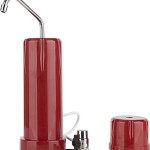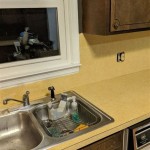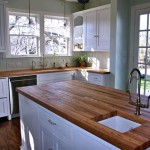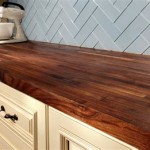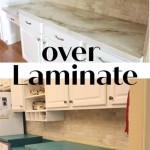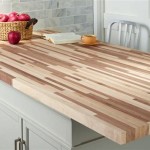Selecting the Ideal Countertop: A Guide to Materials and Considerations
Choosing the right countertop is a crucial decision in any kitchen or bathroom renovation. Countertops are not only functional surfaces but also significant aesthetic elements that contribute to the overall style and value of a home. The optimal countertop material depends on a variety of factors, including budget, aesthetic preferences, lifestyle, and intended use. This article explores various countertop options, highlighting their strengths and weaknesses to aid in making an informed decision.
Durability, maintenance, and aesthetics are key considerations when selecting a countertop material. A robust countertop should withstand daily wear and tear, including scratches, stains, and heat. Low-maintenance options minimize the time and effort required for cleaning and upkeep. Finally, the countertop should complement the existing décor and reflect the homeowner's personal style. With careful consideration of these factors, it is possible to find a countertop that balances practicality and visual appeal.
Granite: A Natural Stone Offering Durability and Elegance
Granite is a popular choice for countertops due to its inherent beauty and durability. This natural stone is extracted from quarries and fabricated into slabs, each with unique patterns and colors. The visual appeal of granite is undeniable, offering a timeless elegance that can elevate the look of any kitchen or bathroom.
Granite is highly resistant to heat, scratches, and stains when properly sealed. Sealing is crucial to prevent liquids from penetrating the porous surface and causing permanent discoloration. Regular resealing, typically every one to three years, is recommended. While granite is durable, it is also a relatively hard material, which can make it brittle and susceptible to chipping or cracking if subjected to significant impact. Professional installation is generally recommended due to the weight and size of granite slabs.
The cost of granite can vary depending on the rarity of the color and the complexity of the fabrication. More common colors and patterns are typically more affordable. While the initial investment may be higher than some other countertop options, the longevity and durability of granite can make it a worthwhile investment in the long run.
Quartz: Engineered Stone with Consistent Quality and Design
Quartz countertops are an engineered stone product, composed of approximately 90-95% ground quartz and 5-10% resins and polymers. This manufacturing process allows for greater control over color, pattern, and consistency compared to natural stone. Quartz countertops offer a uniform appearance and a wide range of design options, from solid colors to patterns that mimic natural stone.
Quartz is non-porous, making it highly resistant to stains and bacterial growth. This eliminates the need for sealing, simplifying maintenance. Quartz is also highly durable, resisting scratches, chips, and cracks. While it is heat resistant, it is not entirely heatproof, and using trivets is recommended to protect the surface from extreme temperatures. The consistent quality and low maintenance requirements of quartz make it a popular choice for busy households.
The cost of quartz countertops is generally comparable to granite, although it can vary depending on the brand, color, and pattern. Installation is typically easier than with granite due to the consistent size and shape of the slabs. The combination of durability, low maintenance, and design versatility makes quartz a compelling option for many homeowners.
Solid Surface: A Seamless and Repairable Option
Solid surface countertops are made from a blend of acrylic or polyester polymers and mineral fillers. This composition allows for seamless countertop fabrication, eliminating visible seams and creating a smooth, continuous surface. Solid surface materials are available in a wide range of colors and patterns, including options that mimic natural stone.
One of the key advantages of solid surface countertops is their ability to be repaired. Scratches and stains can often be sanded or buffed out, restoring the surface to its original condition. While solid surface is non-porous and resistant to stains, it is less heat resistant than granite or quartz. Using trivets is essential to protect the surface from hot pots and pans. Solid surface is also more susceptible to scratching than harder materials.
The cost of solid surface countertops is generally lower than granite or quartz, making it an attractive option for budget-conscious homeowners. Solid surface is also relatively lightweight, making it easier to install. The reparability and seamless appearance of solid surface countertops make them a practical and aesthetically pleasing choice for kitchens and bathrooms.
Laminate: An Affordable and Versatile Choice
Laminate countertops are constructed by bonding a thin layer of decorative laminate to a particleboard or MDF core. This construction method makes laminate countertops a very affordable option, particularly for large surface areas. Laminate is available in a wide range of colors, patterns, and textures, including options that mimic natural stone, wood, and other materials. The versatility of laminate makes it a popular choice for both residential and commercial applications.
While laminate is affordable and visually appealing, it is less durable than other countertop options. Laminate is susceptible to scratches, stains, and heat damage. Once damaged, laminate is difficult to repair, and replacement may be necessary. The seams in laminate countertops can also be a source of moisture penetration, leading to swelling and delamination of the core material. Regular cleaning and maintenance are essential to prolong the life of laminate countertops.
Laminate countertops are typically easy to install, making them a popular choice for DIY projects. The low cost and wide variety of design options make laminate a practical choice for homeowners looking for an affordable and stylish countertop solution. While laminate may not be as durable as other materials, it can still provide years of reliable service with proper care and maintenance.
Wood: A Warm and Natural Aesthetic
Wood countertops, also known as butcher block, offer a warm and natural aesthetic that can add character to any kitchen. Wood countertops are typically made from hardwoods such as maple, oak, or walnut. The natural grain patterns and variations in color make each wood countertop unique. Wood countertops are available in a variety of styles, including edge-grain, end-grain, and face-grain.
Wood countertops require regular maintenance to prevent moisture absorption and bacterial growth. Sealing with a food-safe oil or sealant is essential to protect the surface. Wood countertops are also susceptible to scratches, dents, and burns. Regular sanding and resealing may be necessary to maintain the appearance and integrity of the countertop. While wood is not as durable as other countertop materials, it can be a beautiful and functional choice for homeowners who are willing to invest in regular maintenance.
The cost of wood countertops can vary depending on the type of wood, the style of construction, and the size of the countertop. Wood countertops can be a more sustainable option than some other materials, particularly if the wood is sourced from sustainable forests. The warm and inviting aesthetic of wood countertops makes them a popular choice for kitchens with a rustic or farmhouse style.
Stainless Steel: A Hygienic and Modern Option
Stainless steel countertops are a popular choice for commercial kitchens due to their hygienic properties and durability. Stainless steel is non-porous, making it resistant to bacteria and stains. It is also heat resistant and easy to clean. Stainless steel countertops offer a sleek and modern aesthetic that can complement contemporary kitchen designs.
While stainless steel is durable, it is susceptible to scratches and dents. Fingerprints and water spots can also be visible on the surface, requiring regular cleaning. Stainless steel countertops can also be noisy, particularly when pots and pans are placed on the surface. Sound-dampening materials can be used to mitigate this issue. The cost of stainless steel countertops can vary depending on the gauge of the steel and the complexity of the fabrication.
Stainless steel countertops are a durable and hygienic option for kitchens. While they may require more maintenance than some other materials, their sleek and modern aesthetic can make them a worthwhile choice for homeowners who value a clean and contemporary look. Stainless steel is also a recyclable material, making it a sustainable option.
Concrete: A Versatile and Customizable Choice
Concrete countertops offer a unique and industrial aesthetic that can add character to any kitchen or bathroom. Concrete is a highly versatile material that can be cast into a variety of shapes and sizes. Concrete countertops can be customized with a wide range of colors, textures, and finishes. Integral sinks and drainboards can also be incorporated into the concrete countertop design.
Concrete countertops require sealing to prevent staining and moisture absorption. Sealing should be done regularly to maintain the appearance and integrity of the surface. Concrete is also susceptible to cracking, particularly if it is not properly reinforced. The weight of concrete countertops can also be a concern, requiring reinforced cabinetry for support. The cost of concrete countertops can vary depending on the complexity of the design and the expertise of the fabricator.
Concrete countertops offer a unique and customizable option for kitchens and bathrooms. While they may require more maintenance than some other materials, their durability and aesthetic appeal can make them a worthwhile choice for homeowners who value a modern and industrial look. Concrete is also a relatively sustainable material, particularly if it is made with recycled aggregates.
Ultimately, the "best" type of countertop is subjective and depends on individual needs and preferences. Careful consideration of the factors outlined above will help in making an informed decision that balances practicality, aesthetics, and budget.
:max_bytes(150000):strip_icc()/top-kitchen-countertops-1977143-03-023194027a3749d28b2d06c727d6cfee.jpeg?strip=all)
15 Best Countertop Materials For Kitchens

The Top 8 Best Types Of Countertops For Any Kitchen Gold Eagle

From Quartz To Wood A Look At The Best Kitchen Countertop Materials Boss Design Center

Which Stone Countertop Is Best For Your Kitchen Caesarstone Us

6 Best Countertop Materials For Kitchens

15 Favorite Kitchen Countertop Materials Marble Com

How To Choose The Best Kitchen Countertop Fitzgerald Kitchens

The Best Kitchen Countertop Materials And Remodeling Ideas
8 Types Of Countertops How To Choose The Best Countertop For Your Kit Vevano

8 Types Of Countertops How To Choose The Best Countertop For Your Kit Vevano

